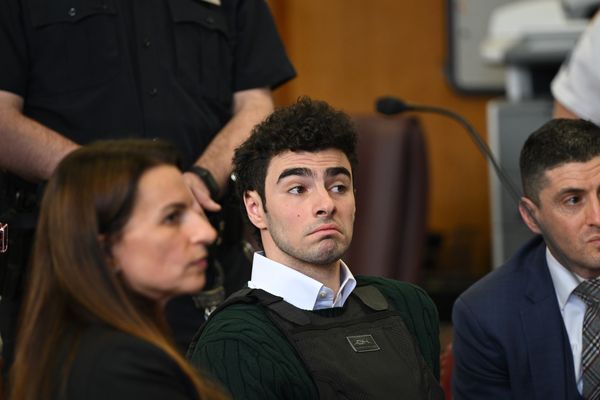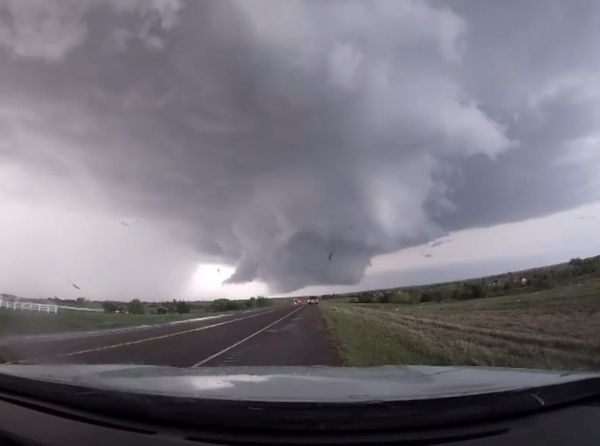
“He was a very good man, a very good doctor, and he was my friend. We were preparing to operate on a patient when he was killed,” says Yuri Aleksiyevich, standing outside the hospital struck by a missile. “It’s such a terrible end to a life spent helping others.”
Dr Aleksiyevich is on his way to the funeral of Oleksandr Korodky, a fellow anaesthetist killed during the attack in Kupyansk, a town retaken by Ukrainian forces sweeping through the east and south of the country in highly successful offensives.
While much of the recently freed territories have remained relatively calm, Kupyansk has been targeted intensively by Russian forces who are still quite close. Thirteen children, three elderly couples and a pregnant woman were among 24 people killed when an evacuation convoy was attacked at the end of last week.
There is regular shelling in Kupyansk, large parts of which have already been damaged and destroyed, when The Independent visits. Groups waiting on streets to be evacuated, or for welfare supplies to arrive, scurry for cover as explosions gouge craters on the road.
Some have become stoic under fire. Iryna Kyzyma, 68, with silver hair and clear blue eyes, shelters in the shell of a shop as clumps of mortar rounds come in. “You have to treat it as noise after a while, you’d be frightened all the time otherwise,” she says.
“I am not sure what’s left to bomb here for the Russians. They have gone but I wish our people would do something about the ones they left behind,” she says, pointing towards two bloated Russian corpses lying on a road.
Ukrainian authorities say a doctor and a nurse were killed at the central hospital in Monday’s Russian missile strike, but locals say the actual number is far higher than has been acknowledged. And the attacks, they believe, will continue as long as Russian guns and missiles stay within range of the city.
Dr Korodky had been working at the hospital for over three decades, becoming a reassuring and familiar figure to the patients and in the community.
“I have been here 25 years and he showed me the ropes when I arrived,” recalls Dr Aleksiyevich. “He had been very busy, like the rest of us, during the last few months when the fighting has been really fierce and we have been overflowing with patients.

“You know, killing someone in the medical profession means not just taking one life, but taking away someone who could save other lives. What could be the justification for that, apart from to cause suffering?”
Another doctor, passing by, shouts: “They do it because they are not human, they are animals, animals... People talk about things like the Geneva conventions, but they don’t care about that, they don’t believe in international rules.”
Dr Aleksiyevich is being accompanied to Dr Korodky’s funeral by a nurse and Yevgeny, a young intern. “He was very helpful to me, encouraging and trusting me, I just want to show my respect,” says Yevgeny. “I’ll continue with my work, like the others, that’s our duty.”
Marina, a nurse, will also continue working. Her husband, Viktor, who is moving belongings on a bicycle, turns to show his face, just the eyes showing through a bandage. “This is what happened to me, there was glass flying everywhere,” he says. “We can’t leave Kupyansk, we have elderly relatives who are not going to leave. So we stay and wait, maybe for more of this.”
Others are fleeing a city that has no power or water but plenty of missiles. But, as they do so, the Russians have been targeting the departing convoys with lethal consequences.
In last week’s convoy massacre, six cars and a van were heading out towards Kharkiv when they were shelled near the village of Kurylivka. Two of the cars were incinerated, the occupants, including a family, burnt alive. Ukrainian officials say some of those trying to escape the carnage appeared to have been shot at close range by a Russian team that had infiltrated behind the lines.
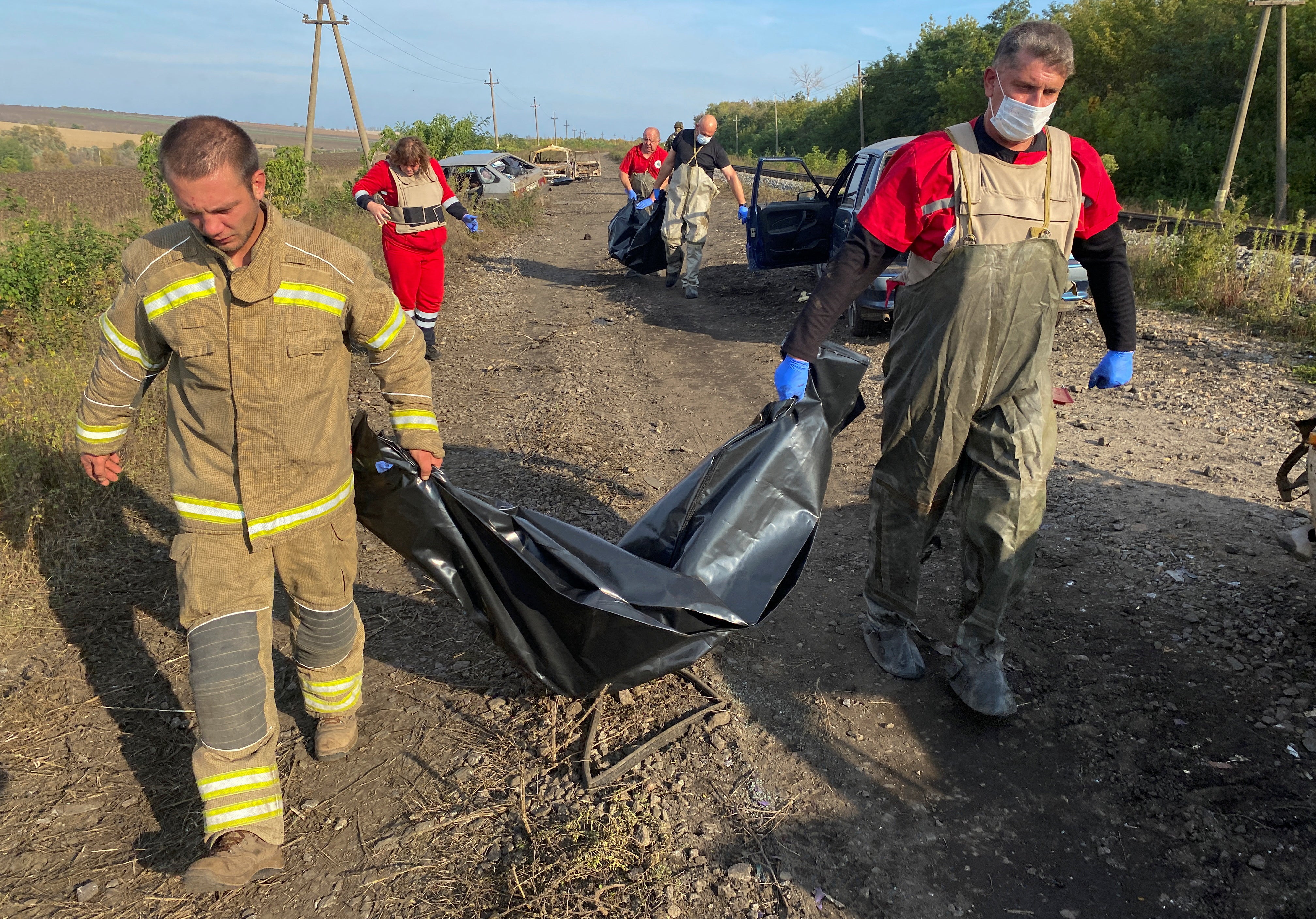
Oleg Siniegubov, head of the Kharkiv regional military administration, says the Russians “killed civilians who were trying to escape the shelling,” adding: “This is cruelty with no meaning or justification.”
Valentina’s uncle, Sasha, was among the victims. She had left the Kupyansk area with her parents and siblings for Kharkiv as soon as the Russians withdrew. Her uncle’s family followed, but he insisted on staying on.
“Uncle Sasha did not want to leave his home, he said people would break in and steal things,” the 28-year-old recounts. “But we are an ordinary family, not wealthy, we haven’t anything much to steal. It was very difficult even to speak to him to persuade him, the phone coverage there is really bad.
“In the end, he changed his mind. And he was in this convoy that was attacked. Now we wonder, should we have got him to leave? But why would they do this? We didn’t think the war would come, the Russians would come, and something terrible like this would happen.”
After the invasion, Kupyansk was used as the administrative centre for Russian-controlled parts of the region, and as its main transport hub. Its recapture was a key component of the Ukrainian counteroffensive which began last month, paving the way for retaking the Russian military stronghold of Izyum. Liberating Kupyansk opens a route into Luhansk, the only one of the territories recently annexed by Vladimir Putin that is fully under Moscow’s control.
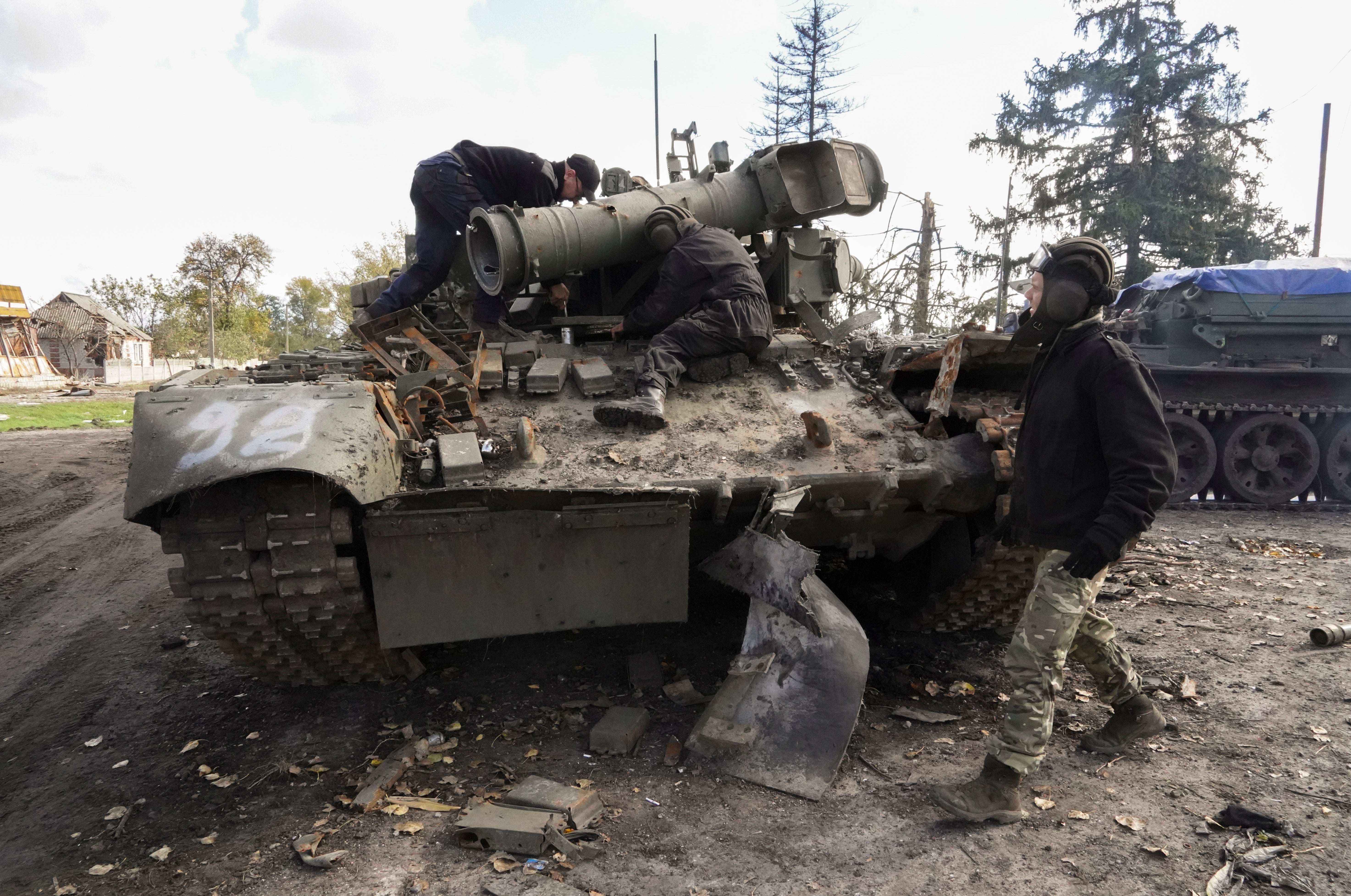
There were no Ukrainian troops in Kupyansk when the Russians came in February. The invaders soon settled in, telling residents: “Russia will be here forever.” Some were so confident of an undisturbed future that they bought property in the city. Volunteer groups say they have evacuated some local women who are pregnant with their Russian partners gone, captured or killed.
Posters were put up declaring “We are one people with Russia” and “Reunited at Last”. Some, partly torn, are still on the walls. Railings of the destroyed bridge over the Oskil river, connecting two parts of the city, remain painted in the white, red and blue of the Russian flag.
Ukrainian troops had retreated from the area when the Russians advanced. Mayor Hennaidy Matsegora handed the key to the city to Moscow and urged citizens not to resist. The Ukrainian government charged him with treason. The Russians detained him in July. He has now disappeared and is presumed to be across the border in Russia.
As in most of the other freed towns and cities, stories of arbitrary imprisonment and torture during the months of occupation are emerging. There are bloodstains on cots and walls in the basement cells of the main police station which, say Ukrainians, were used for torture. Abandoned lists of names of people to be questioned signed by local officials were found by soldiers and the authorities are investigating cases of collaboration.
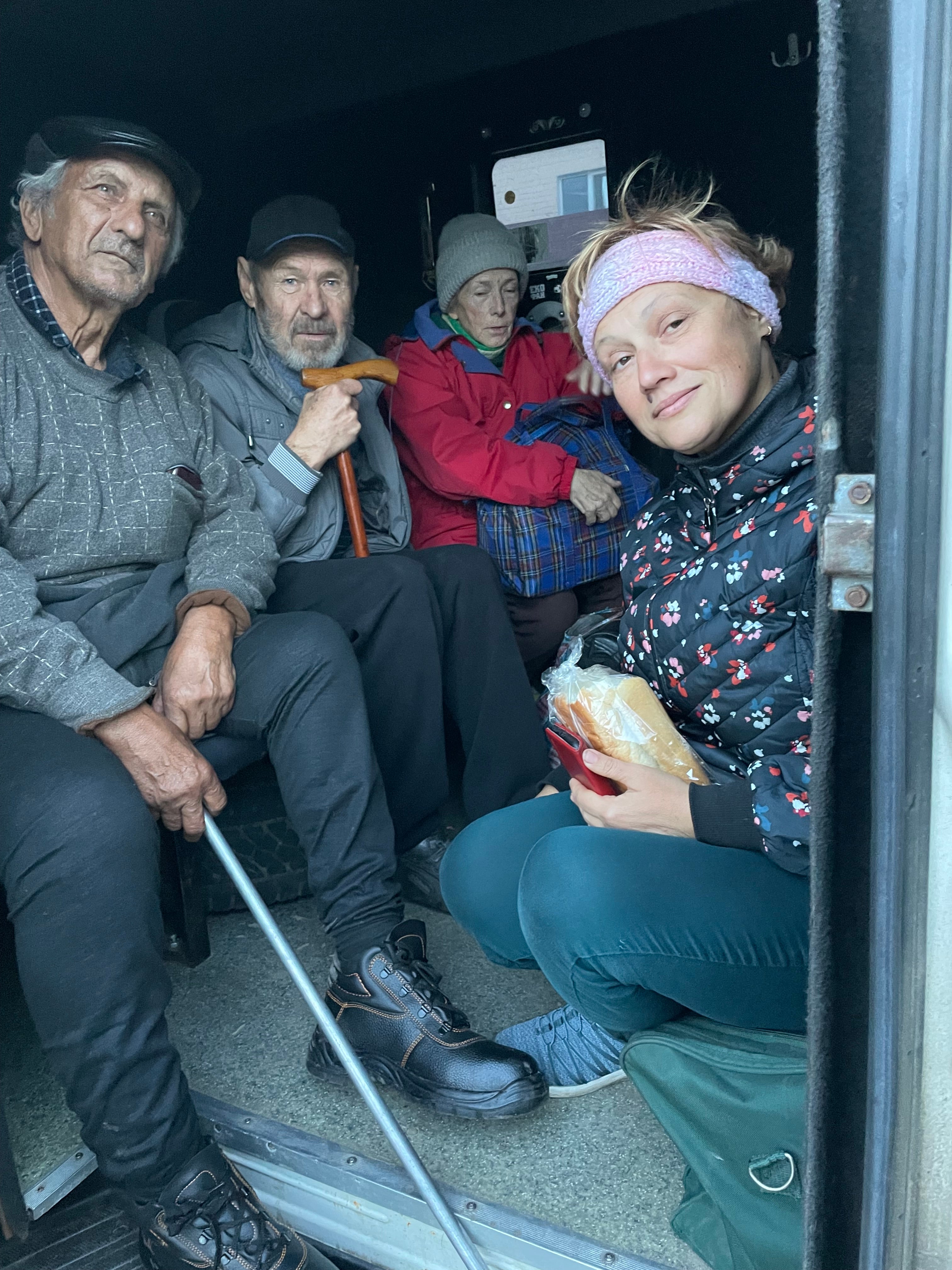
“Some of these people have fled with their Russian masters. But we are hunting those who may still be in Ukraine, we had heard they tried to be evacuated as refugees giving false identities,” says an officer with the SBU (Ukrainian intelligence service). “Some are actually trying to negotiate surrender, they are afraid of being killed by partisans.”
Serhei Pymonenko was arrested by the Russians six weeks after they arrived in the city. “They accused me of spying for the Ukrainian army,” he says. “They searched my place and said they found secret communication kit. That was nonsense; it was just some old radio equipment. I am an electrician so I had such things, it was normal.”
Serhei was taken to the police station and interrogated by fighters from the DNR (Donetsk People’s Republic). “I was punched and kicked, then they pulled me up by my hair and slammed my head against the wall, this went on and on,” he recalls.
“I could not tell them anything because I did not know anything. They kept me for two days and then let me go saying they would be watching me. I lost four teeth and had bruises all over my body.”
Serhei and his family were taken out of Kupyansk by a volunteer group. “I feel very angry about what happened to me,” he says. “There were certainly some people who were pro-Russian. The Russians had also paid pensions to some, I think it was about 12,000 roubles [around £175] and these people were happy.
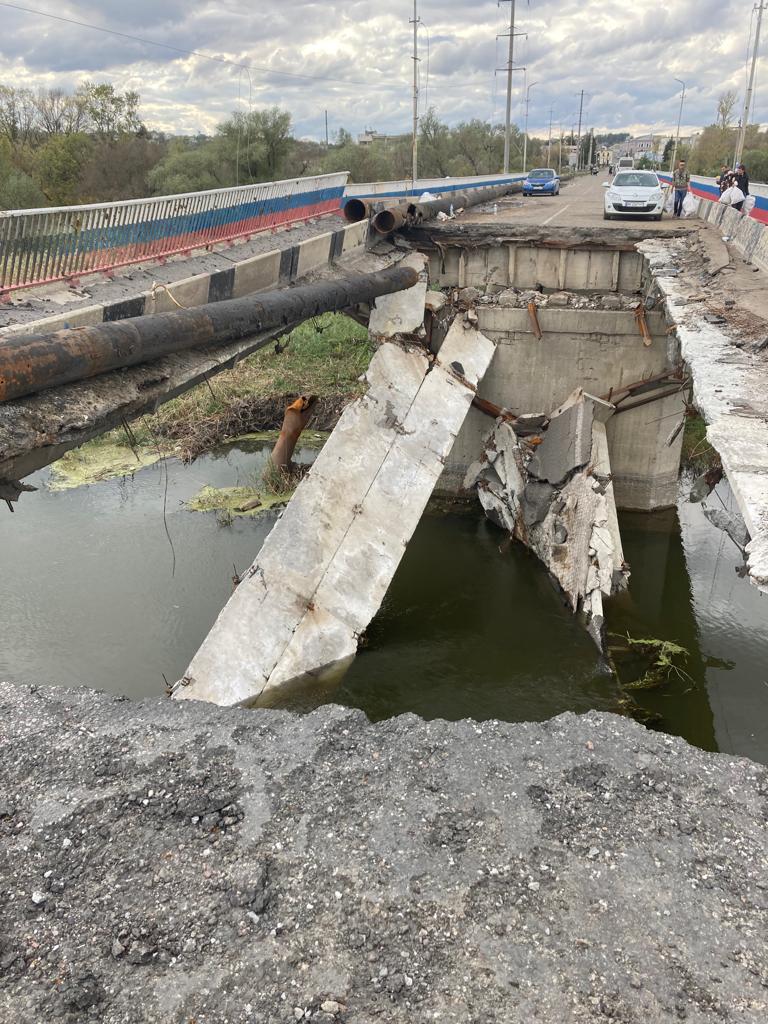
“Maybe they thought they had to provide information in return, and someone just made up stuff about me. But thank God there are patriotic Ukrainians who look after each other like the volunteers who got me out.”
“I am Saved” is one of the most active groups involved in the evacuation. Its name comes from life experience: most of its 40 members are former drug addicts.
Alongside the organisation “Saving Ukraine”, which is carrying out a variety of welfare work throughout the country, the group has evacuated more than 5,500 people from the front line, often in highly dangerous circumstances.
Volunteers from “I am Saved” took part in getting survivors of the Kurylivka convoy massacre to hospitals and they have been under attack on most of their missions.
One of the most deliberately targeted assaults took place at Ruska Luzova, near Kharkiv, four months ago. The village was getting pounded by Russians even after it was supposedly freed, as The Independent discovered during a trip there around the same time.
“That was a particularly bad period, wasn’t it? They were trying to kill us without a doubt when we went,” recalls Dmitriy Lozhenko, one of the team leaders. “Four out of the 10 vehicles in our convoy got hit. Luckily, nobody was badly hurt. I can understand they can make mistakes sometimes, but this was really nasty.
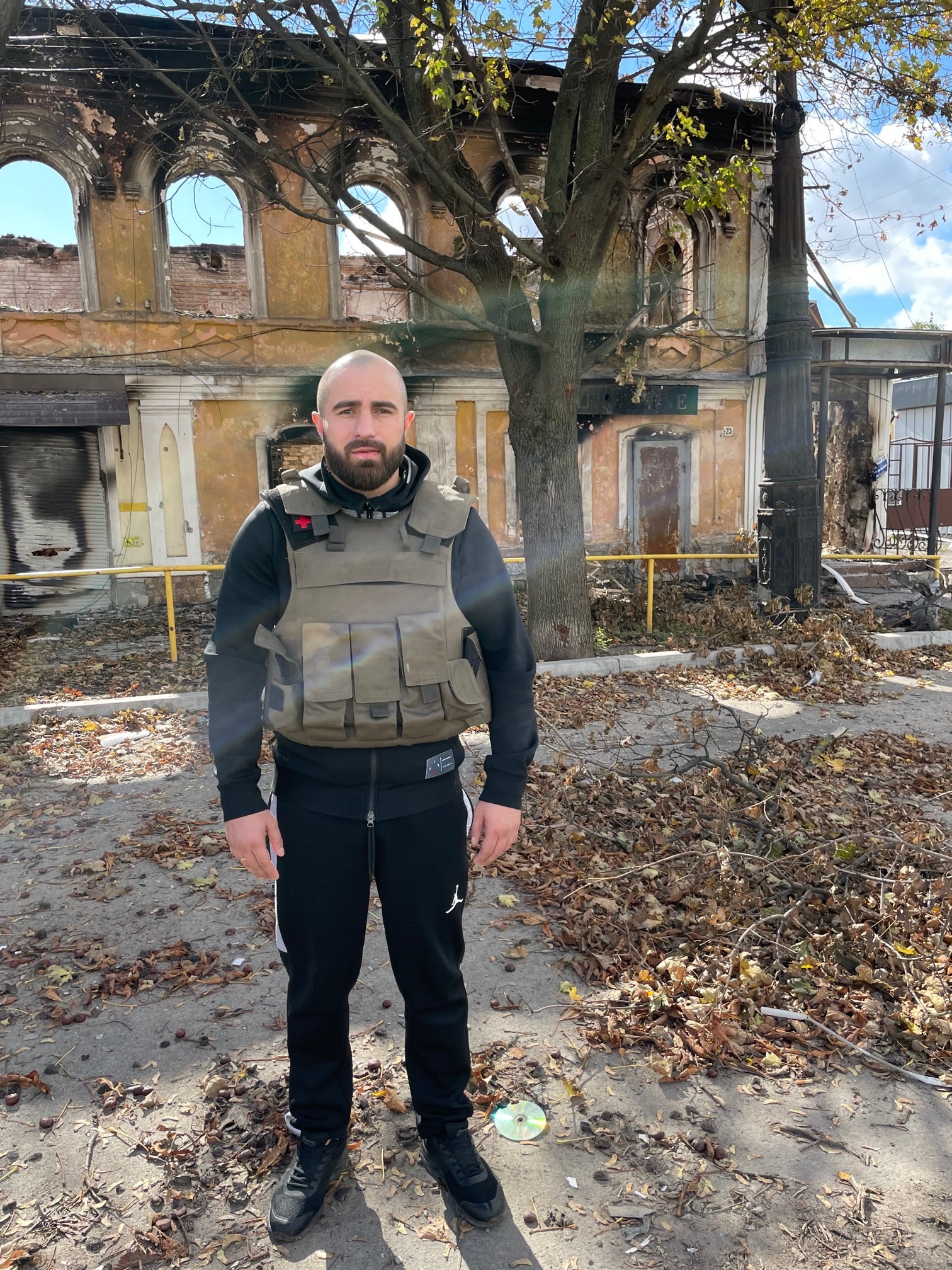
“Kupyansk and places like this have become very risky because the Russians are desperate, so they are taking no chances, firing at anything, and they are after revenge for their losses.”
Dmitriy, 32, was a promising young boxer, sparring with stars such as world champion Vasyl Lomachenko, when he started “mixing with bad people” and paid the price.
“I behaved foolishly, I accept that,” he says. “I do not blame anyone else. Our teams are made up of people who have been through rehabilitation. We decided when the war came that we needed to contribute and this is the way we are doing this.
“It leads to some funny situations. One of our guys had to get a senior police officer and his family out of a dangerous area. This policeman had made our guy’s life a misery in the past. Our mate burst out laughing when he saw this policeman’s face and the man had to thank him.”
Dmitry drives with us around the roads of Kupyansk, pitted with holes from ordnance and littered with burnt-out vehicles, asking residents if they wanted safe passage out of the city. Some simply refused, saying this was their home and this is where they intended to stay.
After navigating our way to a neighbourhood, with artillery fire closing in, to remove a father with two young children, we discover the man has changed his mind and will stay on “and depend upon God”.
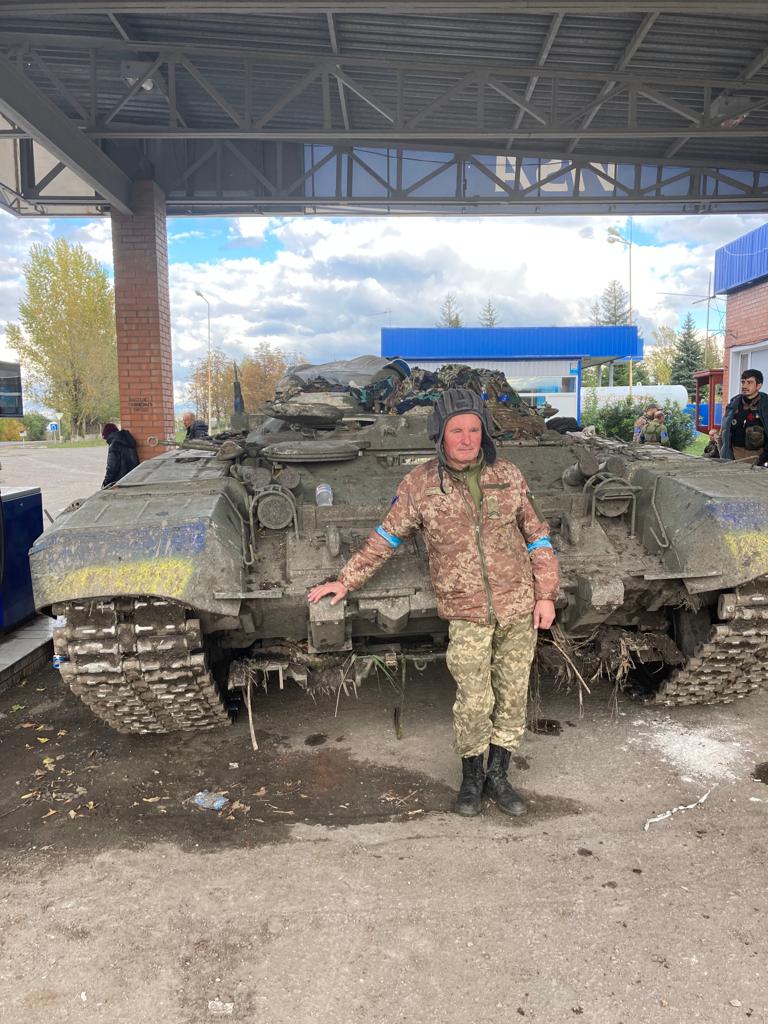
“I don’t think we should stay around here debating the matter with him, we need to get out of here,” says Dmitry driving off. “We will be coming back every day, maybe he and the others will see sense.”
At a petrol station where evacuees are being put into buses, Ukrainian soldiers say they cannot force any remaining residents to leave.
“Would the Russians come back? They’ll certainly try,” says said a young officer. “They are trying to intimidate with all the shelling, but we are going to keep pushing them back and hit their positions, we are not going to stop now.”
Morale of the troops, already high, has been further boosted by the arrival of a captured T-72 tank and a BTR-80 armoured car. Sergeant Vitiy Kravets, who has become something of a legend in his unit for his ability to “liberate” Russian armour, says “these are perfectly OK to use as long as they are properly maintained. They are pretty easy to use and really hardy. So I can only hope the Russians keep supplying them to us.”
Some of the younger men, however, are far keener on Western-supplied Himars (high mobility artillery rocket systems) and MLRS (multiple launch rocket systems) that have proven extremely effective against the enemy.
“Send us more, more please, we say to our allies we can finish the job sooner,” says a captain. As he speaks, Russian shelling begins again not far away. “Hear that? We can end that quickly with enough of the right weapons, that will be good for everyone.”



